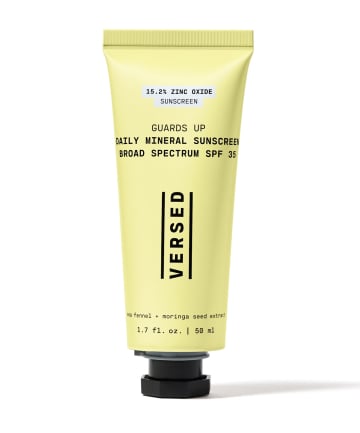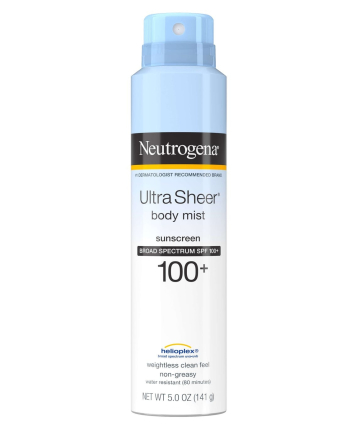Speaking of scalp sunscreen... there are many different SPF formulations available ranging from oils to creams to serums to powders. They all fall into two primary categories though: mineral/physical and chemical. Let's talk about the former.
The former utilizes ingredients such as zinc oxide and titanium dioxide which essentially reflect the sun's rays. For example, Versed's new Guards Up Daily Mineral Sunscreen Broad Spectrum SPF 35, $21.99, utilizes non-nano zinc oxide to protect skin. It's also formulated with pollution fighting moringa seed extract and sea fennel to help block blue light damage.
Buy now
The former utilizes ingredients such as zinc oxide and titanium dioxide which essentially reflect the sun's rays. For example, Versed's new Guards Up Daily Mineral Sunscreen Broad Spectrum SPF 35, $21.99, utilizes non-nano zinc oxide to protect skin. It's also formulated with pollution fighting moringa seed extract and sea fennel to help block blue light damage.
Buy now
Chemical sunscreens are absorbed by the skin and then convert UV energy into a different form of energy. Chemical sunscreens must be applied 15 minutes before exposure (and before getting wet) in order for the product to absorb completely and be able to work its magic.
Neutrogena Ultra Sheer Lightweight Sunscreen Spray SPF 100+, $8.99, is a winner. It applies evenly, dries quickly, and is never sticky. The fact that it's a spray also makes it a bit easier to apply to yourself if you're running solo on the beach or at the pool.
Some find that chemical sunscreens have superior formulations that glide on easily, are less chalky/thick, and make for a more foolproof application. Others prefer physical/mineral-based sunscreens because they are deemed safer for skin and reefs. What type of sunscreen you choose is a matter of preference; the most important factor to consider is whether it's a formulation you'll want to wear every single day.
Buy now
Neutrogena Ultra Sheer Lightweight Sunscreen Spray SPF 100+, $8.99, is a winner. It applies evenly, dries quickly, and is never sticky. The fact that it's a spray also makes it a bit easier to apply to yourself if you're running solo on the beach or at the pool.
Some find that chemical sunscreens have superior formulations that glide on easily, are less chalky/thick, and make for a more foolproof application. Others prefer physical/mineral-based sunscreens because they are deemed safer for skin and reefs. What type of sunscreen you choose is a matter of preference; the most important factor to consider is whether it's a formulation you'll want to wear every single day.
Buy now






